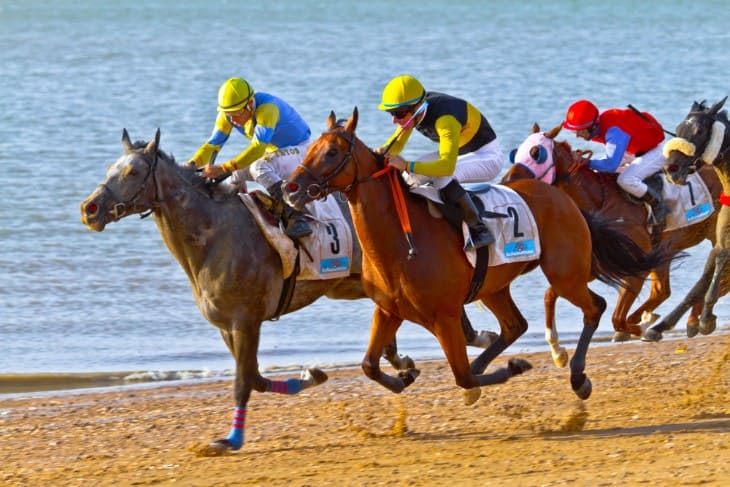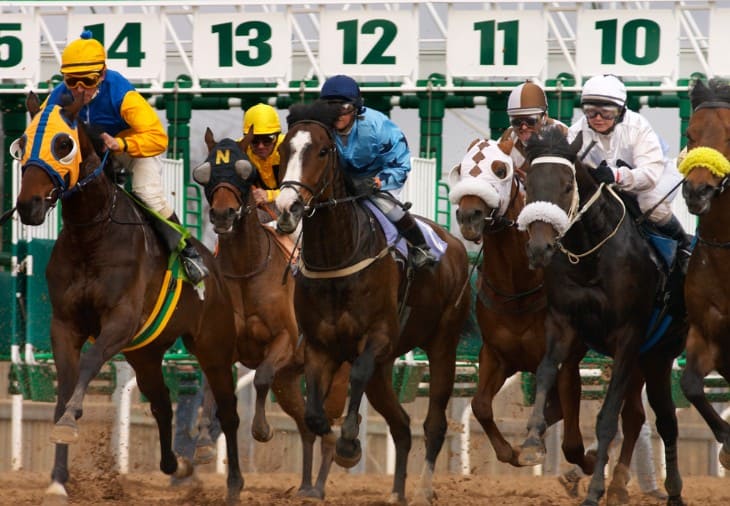Odds in horse racing are a fundamental aspect that bettors must comprehend to make informed decisions. They represent the likelihood of a particular outcome and are usually presented in various formats, including fractional (e.g., 5/1), decimal (e.g., 6.00), and American (e.g., +500). Understanding these odds is crucial for calculating potential payouts and assessing risks. For instance, a 5/1 odd means that for every
£1 staked, the bettor stands to win £5 if successful, excluding the original stake. The odds also offer insight into a horse's perceived chances; shorter odds indicate a higher probability of winning.
- Fractional Odds: Common in the UK, these odds express the potential profit relative to the stake. For example, 4/1 (read as "four to one") means you win £4 for every £1 staked.
- Decimal Odds: More prevalent in Europe and Australia, these odds represent the total return for a £1 stake. So, an odd of 5.00 means you receive £5 in total, including your stake.
- American Odds: Used primarily in the US, these odds come in two forms - positive and negative. Positive odds show how much profit you'd make on a £100 stake, while negative odds tell how much to bet to make £100.
Understanding these odds and their implied probabilities is essential for strategic betting. It's not just about picking the horse you think will win but also about assessing whether the potential return is worth the risk. Smart bettors look for value bets, where the odds are higher than the actual chance of winning, maximising long-term profitability.
A jockey's role in horse racing is pivotal and often a decisive factor in the outcome of a race. Their skills and experience play a crucial part in interpreting and executing race strategies. A seasoned jockey understands the nuances of horse behaviour and can make split-second decisions that could mean the difference between winning and losing. Their ability to gauge the pace of the race and position their horse effectively is a skill honed over years of practice and experience. Moreover, the jockey's weight and riding style can affect a horse's performance, making their physical fitness and adaptability key components of racing success.
The jockey-horse partnership is another critical aspect. A jockey's understanding of their horse's strengths and weaknesses can significantly influence their strategy during a race. This synergy is often built over time through training and racing together, creating a bond that enhances performance. Betting tips often include information about jockeys because their influence on the race outcome is substantial. Bettors closely monitor jockey statistics, such as win rates and previous performances with specific horses, to inform their betting decisions. A top jockey paired with a strong horse can be a powerful combination, and savvy bettors factor this into their betting strategies.
Analysing Racecourse Conditions
Racecourse conditions are a vital element that can significantly impact the outcome of a horse race. Factors such as the type of track surface, the weather, and the course layout are crucial considerations for bettors. Each horse performs differently under varying conditions, and understanding these preferences is key to making informed betting choices. For instance, some horses excel on dry, fast tracks, while others may perform better on wet, softer ground.
When considering Betting Tips, it is essential to assess the following racecourse conditions:
- Track Surface: The surface can vary from turf to synthetic or dirt. Some horses have a clear preference for a particular type of surface.
- Weather Conditions: Weather affects the track condition. Rain can lead to a softer, more challenging surface, which suits some horses better than others.
- Course Layout: The design of the course, including turns and straightaways, can advantage or disadvantage certain horses. For instance, a horse with a strong sprint might do better on courses with longer straight sections.
By analysing these factors, bettors can gain insights into which horses may have an advantage or be at a disadvantage. This analysis forms a critical part of race handicapping and is often the difference between an informed bet and a mere guess. Successful bettors combine this knowledge with other factors, such as horse form and jockey performance, to make educated betting decisions.
When considering Betting Tips, the breeding background of a horse is a critical factor. Bettors often examine a horse's lineage to gauge its potential, especially in races where horses have little to no form to assess. A horse from a prestigious bloodline may be favoured in the betting markets, reflecting the perceived advantages of its genetic heritage. However, while breeding provides valuable indicators, it is not a foolproof predictor of success. Other factors like training, health, and the horse's individual temperament also play significant roles in determining a racehorse's performance.

Common Betting Strategies: Pros and Cons
In the realm of horse race betting, various strategies are employed by bettors in an attempt to maximise their chances of winning. While no strategy guarantees success, understanding the pros and cons of each can help bettors make more informed decisions. A common approach is the 'win' bet, where the bettor simply picks a horse they believe will win the race. This strategy is straightforward but can be risky, as it relies solely on the chosen horse's performance. Another popular method is 'each-way' betting, which is effectively two bets in one: one bet on the horse to win, and another on it to place.
While considering Betting Tips, bettors may also explore the following strategies:
- The Dutching System: This involves betting on multiple horses in a race to ensure a profit if any of them win. The challenge is to divide the stake correctly among the chosen horses to ensure a consistent profit.
- Lay Betting: This strategy involves betting against a horse to win, using betting exchanges. It's akin to taking the role of the bookmaker, offering odds to other bettors.
Each strategy has its merits and drawbacks. Win betting is simple but high-risk, each-way betting offers a safety net but at lower odds, Dutching provides a spread of risk but requires careful calculation, and lay betting offers potential profit from other bettors' losses but can be complex to manage. Bettors often choose a strategy based on their risk tolerance, betting experience, and the specific circumstances of each race.
Money Management: Setting a Betting Budget
Effective money management is crucial in horse race betting, as it helps bettors maintain control over their finances and enhances their overall betting experience. Setting a betting budget is the first step in responsible gambling. It involves determining an amount of money that one can afford to lose without financial strain. This budget acts as a safeguard against the potential financial pitfalls of betting. Sticking to this budget requires discipline, as it can be tempting to chase losses or increase stakes after a win.
In the realm of Betting Tips, one common recommendation is to use a staking plan. A staking plan is a systematic approach to determining the amount to wager on each bet, based on the betting budget and the perceived risk of the bet. There are various staking strategies, including:
- Fixed Staking: Betting a fixed amount or a fixed percentage of the total budget on each bet.
- Variable Staking: Adjusting the stake based on the confidence level or odds of the bet.
Both strategies have their advantages. Fixed staking is straightforward and easy to manage, providing consistency across bets. Variable staking, on the other hand, allows for flexibility and can maximise returns on bets with higher confidence levels. However, it requires more judgement and can be riskier. Regardless of the chosen strategy, the key is to always bet within the limits of the predetermined budget and to avoid impulsive betting decisions. This disciplined approach to money management is a cornerstone of responsible and potentially successful betting.

Insider Tips: Gathering Information from Industry Experts
Gleaning insights from industry experts is a valuable aspect of horse race betting. These insiders, including trainers, former jockeys, and seasoned bettors, often possess a wealth of knowledge that can be pivotal in making informed betting decisions. Their experience and close connections to the sport provide insights that may not be readily apparent from statistical data alone. For example, a trainer may have information about a horse's recent training performance or a jockey's familiarity with a particular horse, which can influence a race's outcome.
When incorporating these Betting Tips into your betting strategy, consider the following:
- Trainer Insights: Trainers are intimately aware of their horses' conditions and capabilities. They can offer insights into a horse's form, fitness, and readiness for a particular race.
- Jockey Comments: Jockeys can provide valuable information about their experiences with different horses and racecourses, which can be crucial in assessing a horse's chances.
- Trackside Observations: Observations from people who are regularly at the racetrack can be informative. They might notice subtle details about the horse's behaviour or conditions at the track that are not evident from afar.
While insider tips can be invaluable, it's important to remember that they are just one piece of the puzzle. They should be weighed alongside other factors such as statistical data, race conditions, and personal analysis. It’s also crucial to verify the credibility of the sources, as misinformation can lead to misguided bets.
When applying Betting Tips, consider the following legal and ethical aspects:
- Compliance with Betting Laws: Ensure that all betting activities comply with local laws, including age restrictions and legal betting methods.
- Responsible Gambling: Practice responsible betting, which includes setting limits, avoiding chasing losses, and being aware of the signs of problem gambling.
- Horse Welfare: Support practices that prioritise the health and well-being of the horses, condemning any form of cruelty or abuse.
Adhering to these considerations not only ensures a legal and ethical betting experience but also contributes to the overall integrity and sustainability of horse racing as a sport.
Conclusion
In summary, understanding the intricacies of horse race betting requires a blend of knowledge, strategy, and discipline. From grasping the basics of odds and probabilities, appreciating the influence of jockeys and track conditions, to the importance of horse breeding and technological tools, each aspect plays a crucial role in informed betting. Additionally, integrating insights from industry experts and maintaining psychological and financial discipline can enhance the betting experience.








